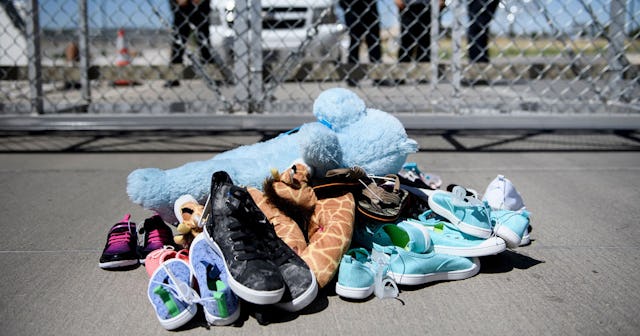ICE Refuses To Reunite 6-Year-Old Migrant Child With Her Remaining Family

In this latest horrifying story involving U.S. Immigration and Custom Enforcement, the government immigration is refusing to reunite a 6-year-old Guatemalan girl with her primary care giver
There have been endless horror stories coming out of immigration detention centers. Some of them involve the horrendous conditions of the border camps and the failure of the US government to provide migrant families with proper health care. Others involve the separation of children from their parents and other primary care givers, which could have a serious and traumatizing long-term mental health impact. A recent story featured by The Guardian, involving a six-year-old girl and her 23-year-old aunt and primary care giver, María, is one of these heartbreaking stories.
Since March 2019 — over nine months ago — María has been forced to remain at the Eloy immigration detention center in Arizona. She arrived at the border in the spring with her six-year-old niece, who she’s raised as her daughter, seeking asylum at the border from Guatemala where they “feared for their lives” after their entire family was murdered by a gang. But instead of helping them, ICE detained María and sent her niece into foster care — 2400 miles away in New York.
The news outlet first reported on the story in October, and it stirred up action amongst lawmakers and clergy, who asked ICE to grant María parole so she would be able to leave detention and reunite with her niece. A woman in New York even offered to house the two, while María awaited a decision on her appeal for asylum. But in mid-December, the application for parole was denied, which officers claimed was due to the fact that María failed to prove she was “not a flight risk” or that her “continued detention was not in the public interest.”
María tells The Guardian that the decision is “depressing” because “it prolongs her separation from the child.” She also revealed that she speaks regularly with her niece who does not want to be apart from her any longer.
“But I tell her she has to be patient, wait a little bit longer,” she told the news outlet. “Just like I’m doing it myself from here.”
“Why does ICE get to say what the public interest is?” Suzannah Maclay, one of María’s pro bono attorneys, added. “It’s very clear what the public is interested in here. It’s helping these people and getting them back together.”
The paper points out that María’s case stands out, as dozens of people have tried to help, to no avail. From American volunteers who obtained copies of official birth and death certificates in order to establish the relationship between the two and to prove her relatives were violently murdered, to finding her pro bono attorneys, no amount of support has been enough to reunite the two. They even helped find her niece up north in the foster system.
“She would have totally lost track of her niece,” Maclay continued. “But it was because the public stepped up and kept track of where the little girl went that they’re even in contact right now.”
Now, María’s supporters are attempting to get ICE to reverse course and grant her parole. They even congregated at the state capitol on Thursday demanding justice.
ICE is “causing further pain, trauma, mental, physical, spiritual health issues that will extend far beyond just this moment in time,” explained the Rev James Pennington of First Congregational United Church of Christ in Phoenix. “It is beyond cruel especially at this time of Christmas.”
In 2018, a federal judge ordered most family separations to end. However, there are currently still around 5,500 known cases of children separated from parents during the Trump administration — and no record of how many kids have been split from guardians who aren’t their biological parents.
If María is not granted parole, there is no way to determine when she will be able to see her niece again — and her asylum appeal could take up to two years. If she loses her appeal, another of her pro bono attorneys, Sean Wellock, explains that she and her niece could be deported separately. For example, her niece could be sent back days, weeks, or months before her, or vice versa.
“There have been complications like a child is leaving and we never get any notice,” Christie Turner-Herbas, an attorney specializing in reunifying migrant families at Kids in Need of Defense, explains. “And then we find out, you know, get a panicked call from the family saying that they heard the child is coming in, but they’re not able to get [to the airport] in time.”
Despite the fact that her days in detention are monotonous María insists she doesn’t “feel abandoned.”
“I have the support of lots of people,” she said. “I’m not alone”.